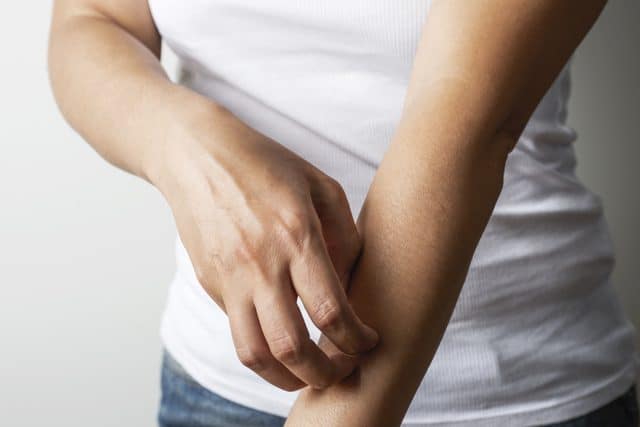Do I have Eczema?

Eczema can cause mild to severe symptoms that affect your skin. Knowing more about this chronic skin condition can help you determine the most effective ways to manage it and avoid flare ups.
Eczema Symptoms
The exact symptoms you experience with eczema can vary. You might have areas of dry skin with or without itchiness. Some areas of your body, such as your hands, chest, ankles, elbows and knees, might have patches of reddish or grayish-brown skin. These patches might occur on the scalp and face when babies have eczema. Other symptoms that can occur when you have this skin condition include tiny bumps that sometimes leak and become crusty. You might also have areas of scaly, thickened skin or skin that is swollen and sensitive due to scratching.
Symptoms of eczema can develop before the age of five. In some people, these symptoms might continue to occur as they get older. You might have eczema symptoms frequently or persistently, or you might have occasional flare ups over the years.
What causes eczema?
Eczema can develop from genetic problems that prevent your skin from fully protecting you from skin irritants, allergens, bacteria and other factors. Food allergies can sometimes result in eczema in children. You might have a higher risk of eczema if you have a family history of this skin condition or if you have a family history of asthma or allergies.
Complications of Eczema
Whether eczema causes mild or severe symptoms, it’s important to manage it effectively. This skin condition can put you at risk of complications, such as chronic itchiness or scaly skin, bacterial and viral skin infections from scratching, hay fever and asthma. Other complications include allergic contact dermatitis, irritant hand dermatitis and sleep issues due to itching and scratching.
Treatment Options for Eczema
Managing eczema is an important part of preventing complications. Different types of treatment options are available depending on how severe this condition is and what triggers it. Medications, such as anti-inflammatory oral or topical corticosteroids, might be used to reduce itching and ease other symptoms. Some of these can also help with skin repair.
Other types of treatment options for eczema include light therapy that can be used on a short-term basis or wet dressings used with topical corticosteroids.
Lifestyle changes can help you manage eczema and prevent flare ups from occurring. These changes might include moisturizing your skin two or more times per day, using an anti-itch cream on the affected skin or taking anti-itch oral medications. Taking warm baths with oatmeal might provide relief, as well as using only mild soaps and other skin products that do not contain harsh ingredients. Other lifestyle changes that might help include avoiding scratching, using a humidifier and wearing clothing that has soft, smooth textures rather than irritating textures. Controlling stress can also help you manage eczema and prevent flare ups.
If you have eczema, please contact Dermatology Treatment and Research Center to set up an appointment.